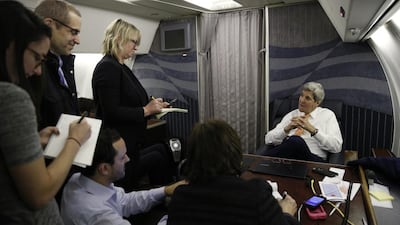Iran has kept its side of the deal with the West over its nuclear weapons programme. Tehran turned back the clock on its nuclear programme and, awaiting completion of remaining parts of the deal, it stands to gain significantly more than the $100bn in funds that have been frozen by sanctions. This, however, doesn’t mean that the 5+1 have given Tehran a blank cheque, noted the columnist Ali Barada in the Lebanese daily Annahar.
Iran has finally turned a page that has been open since the 1979 revolution. Iranian president Hassan Rouhani ended decades of hostility with the United States, United Kingdom, France and other European countries. It was a movement started before him by the former president Mohammed Khatami who normalised relations with Russia, China and other Oriental powers.
“Iran took these measures not only to reassure the world about the peaceful nature of its nuclear programme, but also to confirm its position as a major player in the new international order vying for power and influence across the planet and especially in the Middle East. Iran is part of the unprecedented transformations currently at play in the region,” the writer said.
The Iran deal is a success to be added to US president Barack Obama’s legacy. In his last year in the White House, he managed to get rid of the last remnants of the Cold War by renewing ties with Cuba and Iran, he added.
Typical Iranian slogans of the past like “Death to America” and the “Great Satan” have become obsolete, much like the US administration’s classification of the Islamic Republic within former president George W Bush’s axis of evil.
“This type of confrontation is now a thing of the past,” the writer added.
The implementation of the nuclear deal opens a new chapter in relations between Washington and Tehran. The deal frees billions of Iran’s dollars and highlights a desire for long-term strategic investment from the West in the region as a whole. This is certainly a change for countries like the United States, which have been trying to contain wars and confrontations as opposed to spurring investment that requires large-scale development and reconstruction efforts.
“The implementation of the deal is an investment that calls for a new positive role on the part of Iran but it doesn’t at all give Tehran free rein in this hot region,” he concluded.
Writing in Al Ittihad newspaper, the columnist Abdul Wahab Badrakhan suggested that the big day marking the implementation of the deal couldn’t have come at a better time for Mr Rouhani. Parliamentary elections in Iran are just a few weeks away on February 26.
The overriding feeling in Iran is that the lifting of sanctions is a great achievement that would be favourably reflected in votes for Mr Rouhani’s reform movement. Although some feel that the deal could be a source of concern for Iran’s supreme leader Ali Khamenei, who can be perceived as losing control of Iranian hardline interests regarding the United States.
The writer posed a central question: what was it that made Iran’s adversaries and allies come together and agree over the need to stop it from developing a nuclear weapon?
Ultimately, the writer argued, all six nations involved in the deal with Tehran stand to gain in the post-sanctions era but the Gulf’s interests have not fared well. During the nuclear crisis with Iran, none of the countries involved in the debate shared any interest in the security of the Arab region. They haven’t, the writer continued, objected to Iran’s aggression in Arab countries in order to protect the nuclear deal.
Now these countries appear prepared to protect Iran’s gains and remain silent over its trespasses in exchange for lucrative investment deals.
Translated by Racha Makarem
rmakarem@thenational.ae

